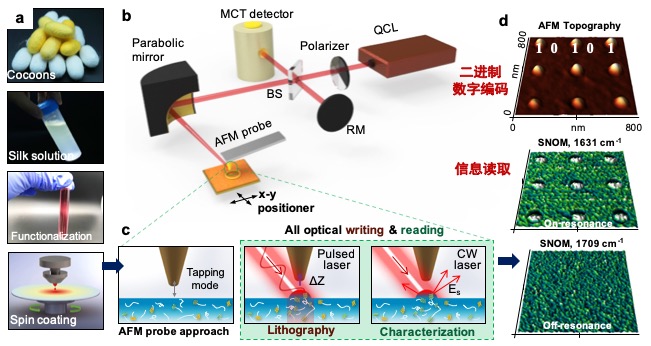Chinese scientists develop first storage medium using silk proteins, implantable in human body

Working theory of silk protein storage Illustration: courtesy of Shanghai Institute of Microsystem and Information Technology of the Chinese Academy of Science
Chinese scientists have developed the world's first hard drive memory using natural bioproteins, which can store digital and biological information at the same time, the study team told the Global Times on Tuesday.
The silk fibroin hard drive not only stores digital data, but also biological information such as blood samples, DNA and vaccines, and can even be implanted into living organisms. Silk proteins are environmental-friendly, resistant to high temperatures, high humidity, strong magnetic fields and microwave radiation, making the silk fibroin hard drive different from existing products.
The silk drive was implanted in a rat on February 10, 2020, without being rejected, according to a report sent to the Global Times from the Shanghai Institute of Microsystem and Information Technology at the Chinese Academy of Sciences (SIMIT) on Tuesday.
The study outlining the breakthrough, A Rewritable Optical Storage Medium of Silk Proteins Using Near-Field Nano-Optics, was published on Monday in renowned international journal Nature Nanotechnology.
"Silk protein is a medium that has never been used in storage, which traditionally uses a semiconductor," Tao Hu, one of the main authors of the study and a researcher at the SIMIT, told the Global Times on Tuesday. "The biological compatibility of the silk drive is good and can be implanted into living organisms, such as the human body, which can be preserved for a long time or even forever."
The study team has also developed read-write equipment for the silk drive, based on a working theory that it can help avoid personal data leaks, due to the fact that the silk drive can be read at certain wavelengths of light, Tao noted. In addition, the silk-protein drive can be made into a time capsule with a predefined life span, via controllable degradation, which also guarantees data security.
"Unless the implant is removed, it is difficult for an external intervention to alter or read the information on the silk protein drive. But then privacy issues need to be addressed in conjunction with brain computers and wireless bioinformatics, which are common problems for all implant systems, which cannot be solved in the short term," Liu Mengkun, a professor at Stony Brook University of New York and co-corresponding author of the paper, told the Global Times on Wednesday.
As an optical storage medium, the silk drive can store digital and biological information with a capacity of 64 GB per square inch and exhibits long-term stability under various harsh conditions. The silk fibroin storage medium is also resistant to bacterial infection and heat-triggered, enzyme-assisted decomposition, according to the paper.
The information in the silk hard drive remained "safe and sound" even after 30 minutes on high heat in the microwave, according to Tao.
As for the commercial prospects of the technology, Liu said that the team had modified silk proteins to achieve information storage for reading purposes.
"In the future, through continuous optimization and improvement of silk protein memory storage capacity and its read-write rate, this technology is expected to become the next generation of high-capacity and high-reliability information storage technology," said Liu.
But Liu noted that the silk protein drive is still in the early stages of concept development and preliminary trial success. At this stage, it will not replace the traditional semiconductor hard disk, but will be used as a supplement.
Just like the metal dogtags worn by soldiers in movies, the silk memory drive can be made into a nameplate that will never be lost, and can therefore serve as an ID. It even promises to hold information under extreme conditions such as outer space, said Tao.
The technology has been patented and will be commercialized in the future, Liu added.